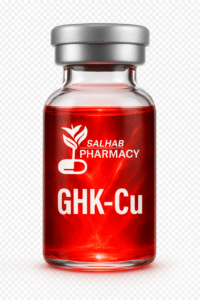Introduction
The global anti-aging market reached $52.44 billion in 2024 and continues to expand rapidly. Among the newest players in this space is GHK-Cu, a copper peptide complex gaining attention for its potential to address everything from wrinkles and hair loss to wound healing and scarring. But does the science support these claims?
What Is GHK-Cu?
GHK-Cu consists of a tripeptide called GHK (glycyl-histidyl-lysine) bonded with copper. Researchers first isolated GHK in 1973, when they discovered it prompted older liver tissue to produce proteins resembling those of younger tissue. Subsequent studies revealed that GHK affects numerous cell types throughout the body.
The peptide exists naturally in human saliva, plasma, and urine, though levels decline sharply after age 60—dropping by more than 50%. This reduction correlates with decreased tissue regeneration, potentially explaining slower wound healing and other age-related changes.
GHK’s strong affinity for copper leads to the formation of GHK-Cu, which appears to have powerful protective and regenerative capabilities. These properties have made it a popular ingredient in cosmetic formulations.
Potential Benefits
Skin Aging and Texture
Research demonstrates impressive results for photoaged skin. In one trial, women applied GHK-Cu facial cream daily for three months. The treatment increased skin density and thickness while reducing sagging and fine lines. Another study found that women using copper peptide eye cream for the same duration showed better improvement in wrinkles and skin thickness compared to both placebo and vitamin K cream.
Additional studies indicate that topical copper peptides can boost collagen production, enhance hydration, and increase skin elasticity.
Hair Growth
GHK-Cu may stimulate hair growth through multiple mechanisms. It activates fibroblasts and promotes new blood vessel formation, ensuring hair follicles receive adequate nutrients. The peptide also inhibits growth factor beta, preventing premature hair follicle miniaturization. Additionally, GHK-Cu supports dermal papilla cells, which play a crucial role in hair formation.
Wound Healing
Animal studies show that GHK-Cu accelerates wound closure and tissue repair. In rabbit models, it improved wound contraction, stimulated blood vessel development, and enhanced antioxidant enzyme activity. Collagen dressings containing the peptide accelerated healing in both healthy and diabetic rats.
However, certain wound types pose challenges. Chronic wounds like diabetic ulcers and bedsores develop enzymatic fluids that break down GHK-Cu, reducing its effectiveness.
Other Potential Applications
COPD and Lung Function: Laboratory studies found that GHK-Cu restored function to lung cells from COPD patients, with researchers suggesting it may reverse gene changes associated with emphysema.
Cancer: While GHK-Cu promotes cell growth—a concern for cancer development—it also demonstrates anti-cancer properties. The peptide appears to suppress metastatic gene expression, and animal studies showed that GHK-Cu combined with vitamin C inhibited aggressive cancer growth.
Pain Relief: Preliminary research suggests GHK-Cu may have analgesic properties, though human studies are limited.
Safety and Side Effects
Overall Safety Profile
GHK-Cu has a long history of safe use in skincare and wound care. It’s naturally occurring, nontoxic, and effective at very low concentrations. Research consistently describes it as safe and well-tolerated.
Considerations
Copper Toxicity: While unlikely with standard skincare use, using GHK-Cu products beyond recommended amounts could lead to copper toxicity. Symptoms include abdominal pain, vomiting, fever, weakness, tremors, and a metallic taste.
Cancer Risk: GHK-Cu stimulates blood vessel formation, which cancer tumors require to grow beyond a few millimeters. Although the peptide has anti-cancer properties, those with active or suspected cancer should exercise caution and consult their physician before use.
Limited Long-Term Data: No human studies have examined extended use of GHK-Cu, so potential long-term effects remain unknown.
Mild Side Effects
Common reactions at the application site include mild redness, itching, or irritation. These typically resolve quickly. Patch testing before use is recommended.
The “Copper Uglies”
Some users report paradoxical skin aging rather than improvement, though this remains rare and poorly understood. This may relate to copper’s effect on metalloproteinases (MMPs)—enzymes involved in collagen breakdown. Elevated MMP activity could theoretically shift collagen dynamics from regeneration into degradation. Using excessive amounts of GHK-Cu products or combining multiple copper peptide products may increase this risk.
Who Should Use It?
GHK-Cu shows promise for individuals seeking to address fine lines, wrinkles, skin texture, and hair thinning. Those with photodamaged or aging skin may see the most significant results.
Those with active or suspected cancer, Wilson’s disease (a copper metabolism disorder), or a known copper sensitivity should avoid the peptide. Those taking certain medications that affect copper levels should consult their healthcare provider first.
How to Use It
Application Method
GHK-Cu is typically applied topically as a cream or serum, though some clinics offer injections or oral formulations. Most research focuses on topical use.
Daily Practice
GHK-Cu doesn’t increase UV sensitivity, so you can apply it day or night. Follow product-specific instructions if they recommend particular timing. Always use sunscreen regardless.
Tips for Best Results:
- Start with small amounts and gradually increase to minimize irritation
- Use a gentle cleanser before application
- Follow with a basic, non-comedogenic moisturizer
- Avoid combining with harsh actives like retinoids, vitamin C, or exfoliants, which can cause irritation or reduce effectiveness
Timeline for Results
Expect gradual improvements rather than immediate changes. Most users experience initial benefits within 2-4 weeks, with more pronounced results appearing after 8-12 weeks of consistent daily use.
Finding Quality Products
GHK-Cu (listed as Copper Tripeptide-1 on ingredient labels) appears in numerous cosmetic products from various brands. When shopping, ensure the peptide is pharmaceutical-grade and safe for human use.
If considering injectable or oral formulations, verify that your chosen clinic uses pharmaceutical-grade peptides rather than research-grade materials, which lack the same purity standards.
Final Thoughts
GHK-Cu represents a promising addition to anti-aging skincare, backed by legitimate scientific research. Its safety profile is reassuring, and the potential benefits for aging skin and hair growth are supported by credible studies. While not a miracle cure, it offers a science-based approach to addressing common signs of aging when used consistently and as directed.

